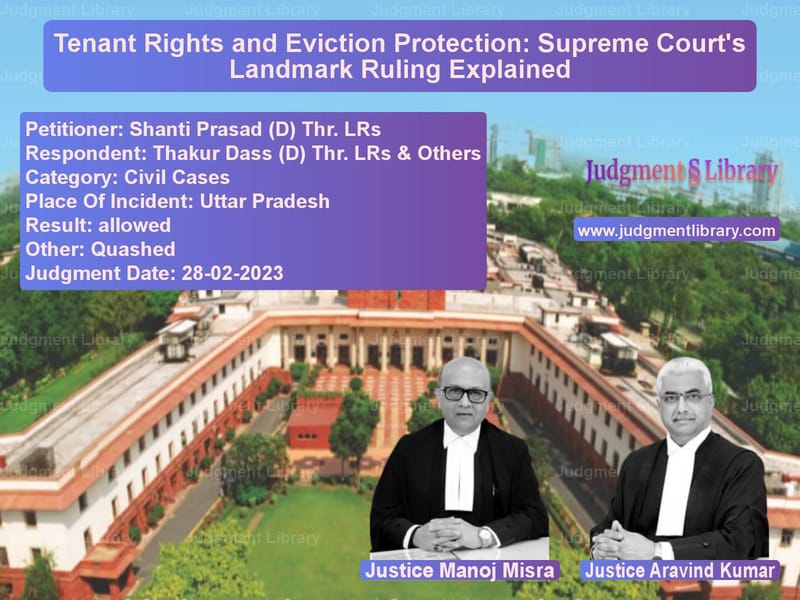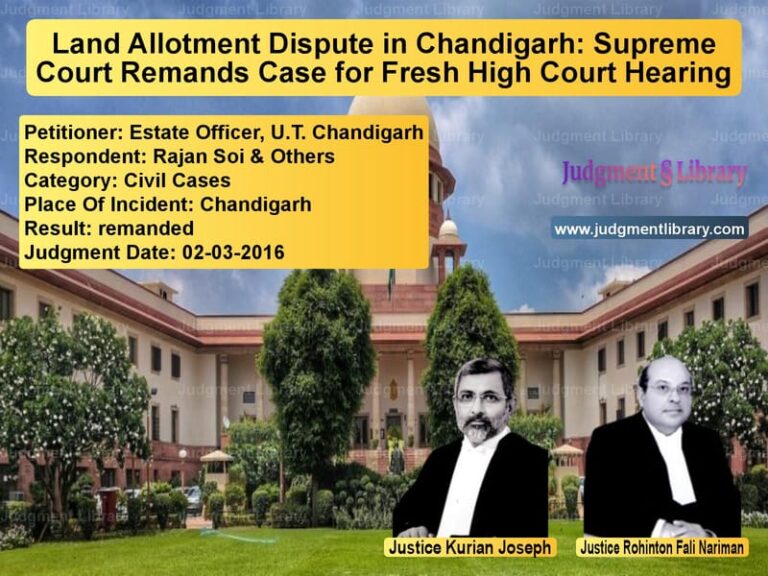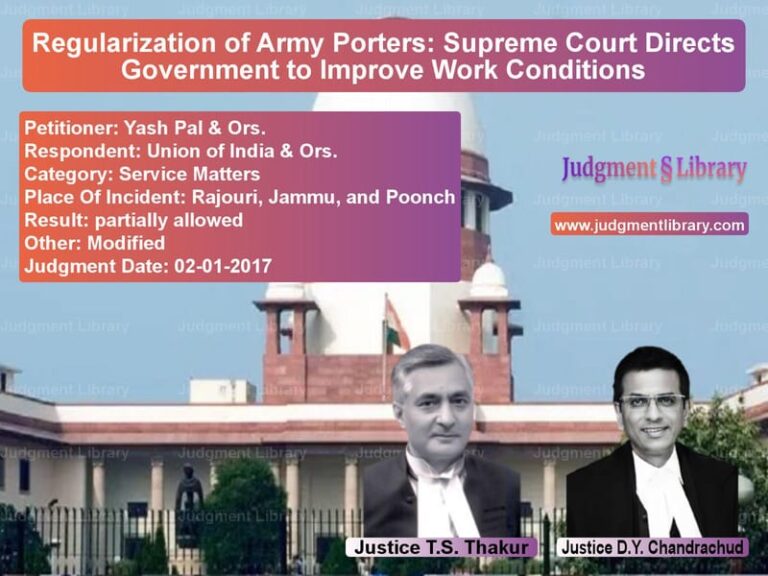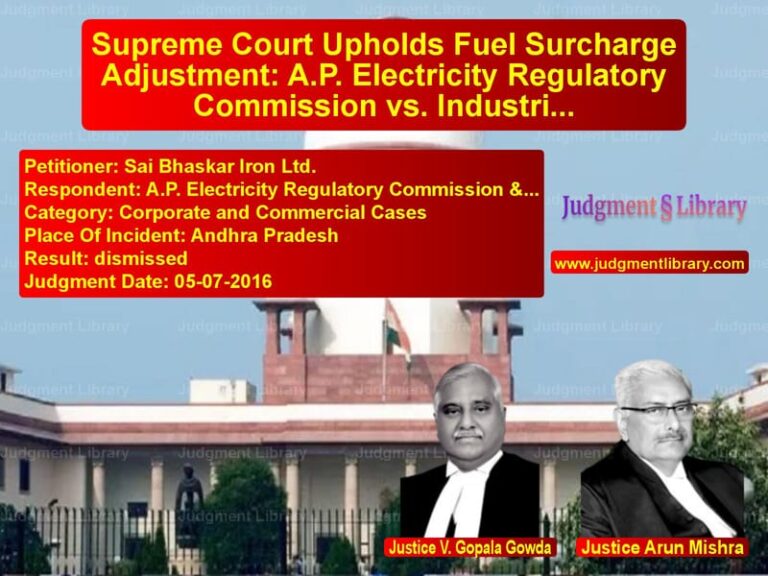Tenant Rights and Eviction Protection: Supreme Court’s Landmark Ruling Explained
The case of Shanti Prasad (D) Thr. LRs v. Thakur Dass (D) Thr. LRs & Others revolves around a dispute concerning tenant rights and eviction proceedings under the Uttar Pradesh Urban Buildings (Regulation of Letting, Rent, and Eviction) Act, 1972 (U.P. Act No.13 of 1972). The primary issue before the Supreme Court was whether the appellant (tenant) was entitled to protection from eviction under Section 20(4) of the U.P. Act despite a dispute over the actual rate of rent.
The case has significant implications for tenant rights and eviction laws in India, particularly concerning the interpretation of the protection provided under the U.P. Act.
Background of the Case
The appellant, Shanti Prasad, was a tenant in a property owned by the respondents. A suit for eviction and recovery of arrears of rent was filed against him on the grounds of:
- Default in payment of rent.
- Making material alterations to the tenanted premises.
The trial court framed multiple issues, including whether the appellant had made material alterations to the property. While the court ruled in favor of the tenant on that issue, it ruled against him on other issues and decreed the suit for rent recovery, mesne profits, and eviction.
The appellant filed a revision petition before the Allahabad High Court, which was dismissed on May 11, 2010. The matter then reached the Supreme Court.
Arguments by the Parties
Arguments by the Appellant
The appellant, represented by his legal counsel, contended that:
- He had deposited Rs.8,910 towards arrears of rent, interest, and court costs before the first date of hearing as required under Section 20(4) of the U.P. Act.
- The lower courts wrongly denied him the benefit of this provision solely because he had claimed the rent to be Rs.45 per month instead of the court-determined Rs.150 per month.
- The trial court did not find any deficiency in the deposited amount, nor did it rule that the deposit was made after the prescribed period.
Arguments by the Respondents
The respondents failed to appear before the Supreme Court despite service of notices. However, the previous rulings were based on the argument that:
- The appellant’s claim regarding the rent amount created ambiguity, making the deposit ‘conditional.’
- Since the appellant did not acknowledge the correct rate of rent in his pleadings, he should not be entitled to protection under Section 20(4) of the U.P. Act.
Legal Analysis by the Supreme Court
Interpretation of Section 20(4) of the U.P. Act
The Supreme Court examined the provisions of Section 20(4), which states:
“A tenant of a building shall not be evicted if, on the first hearing date, he deposits the entire amount of rent due, along with interest and costs, before the court.”
The key question was whether the appellant’s mistake in mentioning the rent amount invalidated his deposit under this provision.
Reliance on Previous Supreme Court Precedent
The court referred to the judgment in Vijay Laxmi Gangal v. Mahendra Pratap Garg (1985), where it was held:
“The Act is a social piece of legislation which leans in favor of tenants. Merely because the tenant had failed to prove his case that the rent was Rs.125 per month and not Rs.360 per month, discretionary relief could not be denied to him even though he had deposited the arrears at the rate claimed by the landlord.”
Findings of the Supreme Court
Based on the law and facts of the case, the Supreme Court ruled that:
- The tenant had deposited the entire arrears, interest, and costs before the first hearing date.
- The courts below wrongly interpreted the law by treating the discrepancy in rent amount as a conditional deposit.
- The tenant was entitled to the benefit of Section 20(4) and protection from eviction.
Conclusion of the Judgment
The Supreme Court reversed the eviction order and ruled in favor of the appellant, setting aside the High Court’s judgment. However, the remaining part of the decree concerning arrears of rent and mesne profits remained unchanged.
Impact of the Judgment
This ruling clarifies that a minor mistake in pleading rent details does not automatically disqualify a tenant from protection under Section 20(4). The decision reinforces tenants’ rights and ensures that eviction protection laws are interpreted in a fair and reasonable manner.
Petitioner Name: Shanti Prasad (D) Thr. LRs.Respondent Name: Thakur Dass (D) Thr. LRs & Others.Judgment By: Justice Manoj Misra, Justice Aravind Kumar.Place Of Incident: Uttar Pradesh.Judgment Date: 28-02-2023.
Don’t miss out on the full details! Download the complete judgment in PDF format below and gain valuable insights instantly!
Download Judgment: shanti-prasad-(d)-th-vs-thakur-dass-(d)-thr.-supreme-court-of-india-judgment-dated-28-02-2023.pdf
Directly Download Judgment: Directly download this Judgment
See all petitions in Landlord-Tenant Disputes
See all petitions in Property Disputes
See all petitions in Judgment by Manoj Misra
See all petitions in Judgment by Aravind Kumar
See all petitions in allowed
See all petitions in Quashed
See all petitions in supreme court of India judgments February 2023
See all petitions in 2023 judgments
See all posts in Civil Cases Category
See all allowed petitions in Civil Cases Category
See all Dismissed petitions in Civil Cases Category
See all partially allowed petitions in Civil Cases Category







